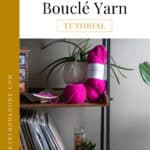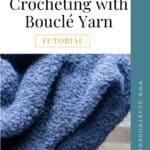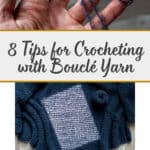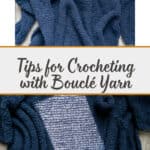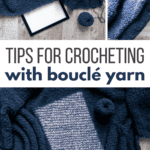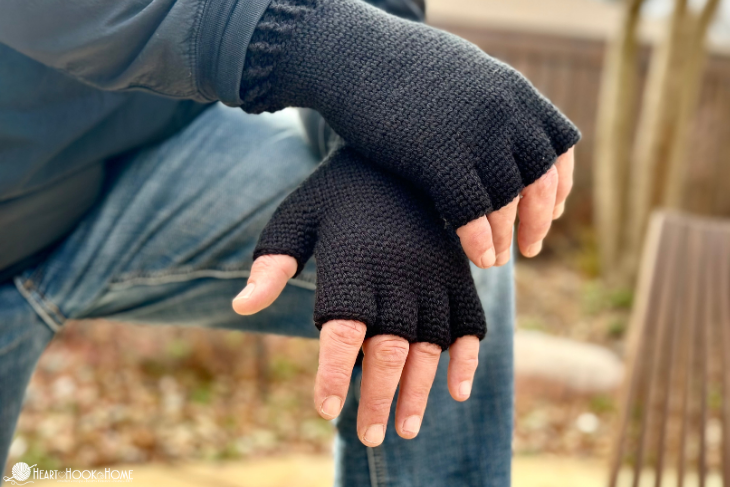8 Tips for Crocheting with Bouclé Yarn
This post may contain affiliate links, meaning that I may earn a small commission if you make a purchase. See our disclosure policy for more information.
Don’t you just love the look of a crocheted garment made using bouclé yarn? While wearing said item is cozy and snuggly and pleasant, crocheting said item may not be. Here are my top 8 tips for crocheting with bouclé yarn.

Tips for Crocheting with Bouclé Yarn
Do you love the look of textured yarns? Bouclé yarn can be used to make gorgeous garments, pillow covers, blankets, amigurumi, and all kinds of crocheted things. It is true that this type of yarn can be difficult to work with, especially in crochet. This is because of the way the bouclé yarn is constructed.

With all that texture and extra fibers the hook tends to grab onto any little aspect of the yarn (instead of the entire strand) which can create snags, splits, or in the very least, uneven stitches. Having said that, crocheting with bouclé doesn’t have to be a nightmare.

I’ve been working on a new cardigan design for Heart Hook Home using the new Bubbly Bouclé from WeCrochet. This yarn is gorgeous, and the colors are AMAZING! This new cardigan is sleek and comfortable, and super light weight. You’re going to love it and I’m going to need one in every color. 🌈


About Bouclé yarn:
Bouclé style yarn is a very fuzzy, textured yarn. Quite possibly the yarn with the most texture available! Can you crochet with a unique boucle texture yarn? Of course you can!
How is it made? In most bouclé yarns there is a nylon cord that is the main thread, with many smaller, fuzzy loops that come off of that main strand.


What weight is bouclé yarn? Bouclé yarn can be thinner and lightweight (like the new Bubbly Bouclé) or a heavier weight yarn (like Teddy from Hobbii).

Is it scratchy? You may think that this type of yarn would be itchy to the touch but in my experience that is quite the opposite. This yarn is great for all kinds of projects, from the new cardigan design I’m working on, to kid projects including amigurumi (as in teddy bears!) How adorable would that be?! A Boucle Bear!

Bouclé Yarn Best Practices:
1. Keep it simple. I’ve found that if using bouclé yarn with a traditional crochet pattern, keeping the stitches simple is the way to go. Single crochet is the best stitch to use. Any fancier stitch or textured stitch will lose all definition with this yarn. Save yourself the headache and start with simple stitches, such as single crochet or maybe half double crochet. When I used double crochet the fabric lost integrity, stitch definition, and felt sloppy.
2. Use plenty of stitch markers. Stitch markers help to easily show the first stitch or the last stitch of a row, or mark a certain row number, or they can be used to mark the right side vs wrong side of the fabric. It can be very difficult to tell right side from wrong side so using a marker to indicate the right side when you start the project will help significantly.
3. Don’t use too small of a crochet hook. It is imperative that you can see the main loop of the yarn (the nylon cord portion) and if your stitches are too small this is nearly impossible. I find that with traditional crochet I need to go up at least one hook size, possibly two.
4. Stay a bit loose. Let the fuzzy loops of the bouclé yarn help to dictate how large the stitches are and let them settle into place. The fuzzy loops are fairly consistent so it helps your stitch size to be, too.
5. Take your time! Mastering your tension and staying consistent with sizing of your loops is key. Don’t rush the process or you’ll find yourself fighting the process in the meantime.
Wanna save this for later?
6. Try Tunisian if you can! I’ve found that not only do the Tunisian stitches lay flatter and the loops are easier to see, but the project requires MUCH less yarn. This makes for a lighter weight garment as well, which I always love. I caution you to stay loose on the backward pass lest the project start to narrow in on you.

7. Use a light pad. If you are crafty in other areas you may already own a light pad, say for weeding vinyl cut on your Cricut machine. If not, you can grab an inexpensive one like the one I have on Amazon. Check out the definition of those stitches with the light turned on! 🔦😲


This light pad will also come in super handy if/when you’re crocheting with black or darker yarns, or when using other yarns that are fuzzy or may otherwise be hard to see and count your stitches. Here are more tips for crocheting with difficult yarns:
Tips for crocheting with black yarn
Tips for crocheting with velvet yarn
Tips for crocheting with fur yarn
If a light pad isn’t in the cards you could use a white notebook and simply set it on your lap and that will help as well.
8. Frog carefully. While frogging (ripping out) your project is never fun, doing so with bouclé can be doubly tiresome.
Here are some tips for frogging bouclé yarn:
Don’t yank. Never pull the yarn tight while frogging, this promotes bunching of the smaller bouclé loops and may snap the yarn.
Keep the fabric you’re frogging taut. If you hold the width of the piece and pull gently to spread the loops open frogging goes much easier. It may be super helpful if you have a second (or third!) person to help hold it while you wind the yarn back into a ball.
What tips do you have for working with textured or boucle yarn? If you do something not listed here that works well for you be sure to add a comment so I can update the post!
More crochet tips & techniques:
7 Tips for Counting Rows in Crochet
Best of 2023 (Top Patterns, Favorite Tutorials, and More!)
How to Block Crochet: Spray, Wet, or Steam Blocking
Lucet Fork Tutorial: Make Cord, Drawstring, Garland and More!

